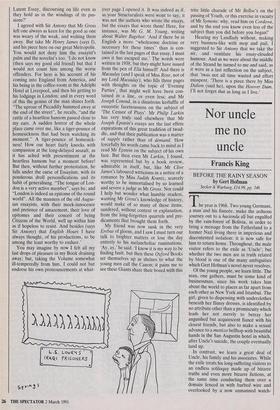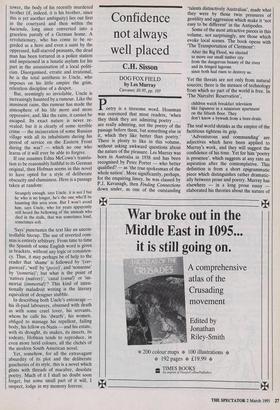Nor uncle me no uncle
Francis King
BEFORE THE RAINY SEASON
by Gert Hofman
Secker & Warburg, £14.99, pp. 346
The year is 1968. Two young Germans, a man "and his fiancée, make the arduous journey out to a hacienda all but engulfed by the rain-forest of Bolivia, in order to bring a message from the Fatherland to a former Nazi living there in imperious and discontented isolation: it is now safe for him to return home. Throughout, the male visitor refers to the exile as `Uncle'; but whether the two men are in truth related by blood is one of the many ambiguities which Gert Hofman's novel never resolves.
Of the young people, we learn little. The man, one gathers, must be some kind of businessman, since his work takes him about the world to places as far apart from each other as New York and Istanbul. The girl, given to dispensing with underclothes beneath her flimsy dresses, is identified by no attribute other than a promiscuity which leads her not merely to betray her anguished but acquiescent fiancé with his closest friends, but also to make a sexual advance to a mestizo bellhop with beautiful hands in the San Augustin hotel in which. after Uncle's suicide, the couple eventually land up.
In contrast, we learn a great deal of Uncle, his family and his associates. While the exile treats his long-suffering visitors to an endless soliloquy made up of bizarre truths and even more bizarre fictions, at the same time conducting them over a domain fenced in with barbed wire and overlooked by a now unmanned watch- tower, the body of his recently murdered brother (if, indeed, it is his brother, since this is yet another ambiguity) lies out first in the courtyard and then within the hacienda, long since converted into a graceless parody of a German home. A revolutionary, who has come to be re- garded as a hero and even a saint by the oppressed, half-starved peasants, the dead man has been tortured in a police station and imprisoned in a lunatic asylum for his part in the assassination of a local politi- cian. Disorganised, erratic and irrational, he is the total antithesis to Uncle, who imposes on his little empire the grim, relentless discipline of a despot. But, seemingly so inviolable, Uncle is increasingly haunted by a rumour. Like the imminent rains, this rumour has made the atmosphere of his life more and more oppressive; and, like the rains, it cannot be escaped. Its exact nature is never re- vealed; but it is clearly of some terrible crime — the incineration of some Russian village with all its inhabitants during his period of service on the Eastern Front during the war? — which no one who learns of it will ever be able to forgive.
If one assumes Edna McCown's transla- tion to be reasonably faithful to its German original, then Hofman seems in this novel to have opted for a style of deliberate obscurity and clumsiness. Here is a passage taken at random: Strangely enough, says Uncle, it is not I but he who is no longer, he's the one. who'll be haunting this area soon. But I won't avoid him, says Uncle, who for years apparently still heard the bellowing of the animals who died in the stalls, that was sometimes loud, sometimes soft.
`Says' punctuates the text like an uncon- trollable hiccup. The use of inverted com- mas is entirely arbitrary. From time to time the Spanish of some English word is given in brackets, without any logic or consisten- cy. Thus, it may perhaps be of help to the reader that `shame' is followed by Iver- guenzaY, `well' by `(pozo)', and 'nonsense' by `(tonteria)'; but what is the point of `natives (natives)', `canal (canal)' or `im- mortal (immortal)'? This kind of inten- tionally maladroit writing is the literary equivalent of designer stubble. In describing both Uncle's entourage his ill-paid labourers, obsessed with death as with some cruel lover, his servants, whom he calls his 'dwarfs', his women, obliged to massage his repellent, failing body, his fellow ex-Nazis — and his estate, with its drought, its snakes, its insects, its rodents, Hofman tends to reproduce, in even more lurid colours, all the clichés of the modern South American novel.
Yet, somehow, for all the extravagant absurdity of its plot and the deliberate gaucheries of its style, this is a novel which glints with threads of macabre, desolate poetry. Much of it I shall no doubt soon forget; but some small part of it will, I suspect, lodge in my memory forever.



















































 Previous page
Previous page